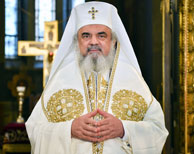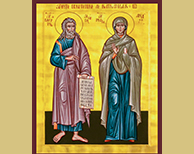Today, 12 June 2016, the Orthodox Church is on the 7th Sunday after Easter. The Church scheduled for today the reading from the Gospel text presenting the “Prayer of Jesus, our Saviour”. This Sunday is also dedicated to a very important event in the life of the Church, namely the First Ecumenical Council of 325, convened by Saint Emperor Constantine the Great, where, according to tradition, 318 Holy Fathers were present.
His Beatitude Patriarch Daniel delivered a sermon in Saint Great Martyr George chapel of the Patriarchal Residence, in which he explained the text and spoke about the First Ecumenical Council. The Patriarch of Romania mentioned the fact that from a theological point of view, this feast has a deep spiritual significance, because it relates the feast of the Ascension of the Lord to the feast of the Pentecost. The Holy Fathers remembered this Sunday, through their confession of faith which has become the Orthodox Creed, show us the relationship between the Ascension of the Lord and the Pentecost, as well as the meaning of the incarnation, sufferance, death, and resurrection of Jesus Christ, our Saviour, and especially of His Ascension to Heaven in glory to raise the humans from sin and death and give them the everlasting joy to eternally live together with God the Father, Son, and Holy Spirit, His Beatitude said.
The Primate of the Romanian Orthodox Church emphasised the fact that the prayer included within the Gospel text is a prayer of pastoral responsibility addressed to all spiritual shepherds.
Today’s Gospel text is also addressed to all spiritual shepherds teaching us all the responsibility to God for all those entrusted to their service. What does service mean? It means to be spiritually fed on the true faith, on the grace of the Holy Sacraments and to guide on the way of salvation those whom God entrusted us, in the Church, to the Kingdom of the Most Holy Trinity. This is why this prayer is not only a prayer for unity, but also a prayer of pastoral responsibility.
This Gospel text is very significant for all times, as well as for our time. It shows us that it is only in the communion of the saints that the true faith is preserved, His Beatitude Patriarch Daniel underlined. Both the Gospel and remembrance of the Holy Fathers of the First Ecumenical Council show us that true faith is not preserved in isolation, but in communion of thought, confession, and living with the entire Church, just as the Holy Fathers convened at the First Ecumenical Council of Nicaea confessed the true faith together and denied Arius’ confusion or heresy. In other words, the true faith is preserved in the Church and by the Church, and it is only in the communion of saints of all times that the true saving and deifying faith is preserved. Whenever we confess the true faith it should be the same holy faith of the Saints Apostles and of the Holy Fathers of all times and places.
The Patriarch of Romania has also spoken about the true faith showing that we lose our salvation without it, because it is the foundation needed for attaining eternal joy.
The true faith is the foundation of our salvation, for attaining eternal life and joy. If we have fallen out of the true faith we have also lost salvation, namely if we do no longer confess the divinity of Christ and are no longer united with Christ, if we do no longer confess the divinity of the Father and the divinity of the Son, we separate from the Holy Trinity. Thus, we see that the true faith is confessed in communion, and the canonical form of the greatest responsibility of the confession of the true faith is the synod; the synod of the local Church, the synod of a region, and the synod of the entire world, as the ecumenical councils were called, just to explain the ecumenical term to everybody to understand it.
















